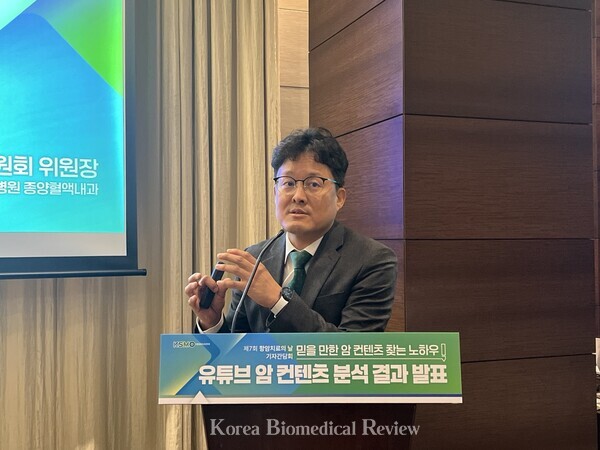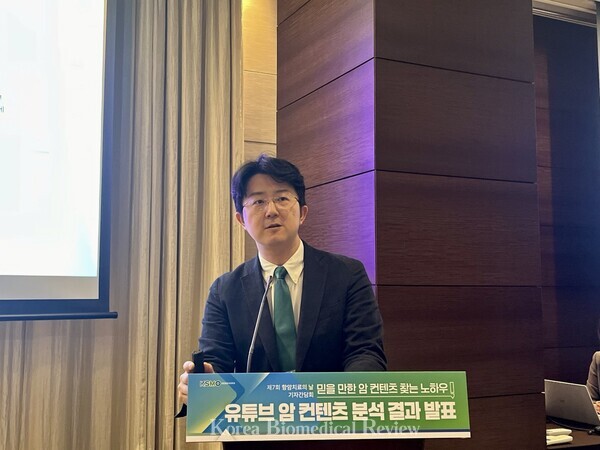As cancer patients in Korea confront the reality that conventional treatments may no longer hold hope, many turn to the online world—searching for miracle cures in high-dose vitamins, hyperthermia therapy, and vague promises of recovery.
But in their desperation, they often find more exploitation than salvation, as YouTube becomes a marketplace for misinformation that preys on their fears and desires.
“The influence of misinformation is insidious,” said Lee Sang-cheol, professor of hematology-oncology at Soonchunhyang University Cheonan Hospital. “Patients, some of whom are already undergoing traditional medical treatments, often explore these alternatives, unaware of the risks.”
At the 7th Cancer Treatment Day hosted by the Korean Society of Medical Oncology (KSMO) on Wednesday, experts revealed findings from their latest analysis of cancer-related content on YouTube. Of the 491 cancer-related videos analyzed, over one-third (34.8 percent) contained advertising or promotional content, raising concerns about the reliability of the information patients are consuming.

When doctors inform patients that their options have been exhausted, the search for answers becomes a matter of instinct, a deep, human drive to find something—anything—that might work. This is where the commercial interests of online content creators capitalize on vulnerability and fear, capitalizing on those in search of hope.
Lee sees it repeatedly: patients, after being told their cancer treatments have reached a dead end, decide to stop therapy, claiming they need to ‘rebuild their strength.’ But for many, the real motivation isn’t recovery—it’s the allure of the unverified claims found online.
Lee said medical institutions like Seoul National University Hospital, Asan Medical Center, and Samsung Medical Center maintain channels that prioritize delivering fact-based information. They aren’t interested in providing emotional comfort, he said; their focus is on accuracy, however unpalatable it might be.
Independent channels, however, often blur the lines between information and promotion, highlighting personal stories and emphasizing integrated care. These channels, while sometimes offering helpful insights, tend to use keywords that cater to the vulnerabilities of their audience, pushing content with less reliable foundations.
Despite reliable sources like the National Cancer Information Center, which has just 23,800 subscribers, these channels remain largely unseen to the average viewer. “They’re not engaging enough,” said Choi Won-young, a professor of cancer biomedical science at National Cancer Center Korea, who presented the findings, “and their content doesn’t always align with what patients want to hear.”
Instead, cancer patients flock to videos that promise miraculous cures, no matter how ungrounded in science. What's more, YouTube’s algorithm amplifies these videos, favoring those that draw the most views—often tied to clinics and hospitals—pushing less reliable content into the spotlight.

The analysis also revealed that smaller clinics and oriental medicine centers, though fewer in number, dominate this category, with nearly 90 percent of their videos linked to commercial interests. Channels with fewer than 100,000 subscribers were particularly prone to promoting products or services, with a 53.5 percent chance of doing so—far higher than the 34.7 percent of mid-tier channels or the 4.5 percent of those with over a million subscribers.
Other red flags surfaced. Videos with vague participant affiliations or those promoting lifestyle and dietary changes often carried a commercial agenda.
To combat this, YouTube has introduced a “health source information panel” certification for channels operated by qualified medical professionals. Of the content analyzed, Choi said 38.1 percent carried this label. These videos tended to focus on "integration," with 82 percent mentioning the term, while non-certified content leaned heavily toward keywords like "effectiveness" (86.7 percent), "prevention" (80.9 percent), and "overcoming" (70 percent).
"Cancer patients, already overwhelmed by fear, are increasingly seeking out these videos for answers, and they're often finding the wrong ones,” Choi said.
“We’re in an era where video is king,” added Lee, acknowledging the inevitable rise of such content. “And unfortunately, that means individuals with promotional agendas will continue to exploit this platform.”
While some content creators may genuinely care about raising awareness, Choi said their passion often lacks the expertise necessary to support their claims. "Passion isn’t always enough when it comes to accuracy," he said. He added, "Being passionate about cancer content doesn’t make you an oncology expert."
Related articles
- KSMO to host 'Best of MASCC 2024 in Korea' this Saturday in Seoul
- Global oncology group chiefs highlight collaboration at KSMO 2024
- Deceptive practices in Seoul's beauty industry: non-specialists posing as dermatology experts
- Experts discuss raw food safety for cancer patients undergoing chemo
- Legal battle escalates over oriental doctors’ use of ‘Western’ devices

